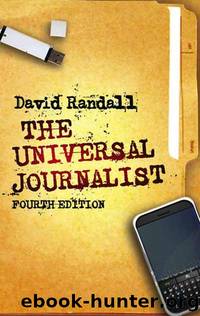The Universal Journalist (4th Ed) by David Randall

Author:David Randall [Randall, David]
Language: eng
Format: epub
Tags: Journalism, Media Studies, Non-Fiction, Popular Culture, Social Science
ISBN: 9780745330778
Google: zIaGbwAACAAJ
Amazon: 0745330770
Publisher: Pluto Press
Published: 2011-05-14T23:00:00+00:00
Case history: Hurricane Katrina, 2005
With most disaster stories, like the 2004 Tsunami and 2005 Pakistan earthquake, the media gets it more or less right. But the way we cover disasters, and the sources of immediate information on them, are changing. The classic case of this was the Hurricane Katrina disaster in 2005 when the death toll was widely reported to be 10,000 (wrong by a factor of ten, as it turned out), and papers were full of accounts of multiple rapings, knifings and killings in the New Orleans Convention Center, all now known to be wildly exaggerated.
The errors were in part the result of pressures created by a 24/7 media of TV news channels and the Internet. These encourage journalists to build on each other’s scariest death tolls and horror stories until everything is hopelessly exaggerated – a bit like that game you play as children where one lays a hand on another’s, and, with hands being madly removed from the bottom and placed on top, you go higher and higher. There is certainly a fear, within a competitive media, of being slow to appreciate what is happening, and of not having the latest death toll. In those circumstances, would you want to be the editor who prints only official death tolls (which can often be days behind events), not the estimates of experts at the scene? The responsible thing is to report both, making plain (‘feared dead’ is the convention used for unofficial estimates) the source of each figure.
Too bad then, if the experts and local politicians get estimates badly wrong. They were the source of the 10,000 figure, and the media (some of whom grabbed too keenly at a stick with which to beat President Bush) reported it. After all, they didn’t have any other answer to the pressing question of how many died because the usual, official channels had broken down. Into this vacuum rushed the 10,000. The same applies to the stories of violence from the Convention Center, and of sniper fire at helicopters. In the absence of official word, the testimony of shelterers and bloggers filled the gap. The alternative is waiting patiently for official word (by no means always true) and suppressing the word on the street. In the days of ‘citizen journalists’ you can’t do that. When I wrote news reports on the Egypt, Bali and Delhi terror bombings, the wires had, in the first few hours, virtually no eye witness accounts. But blogs like the BBC’s were full of emailed testimony from those at the scene, and I used them. I had no time to check if these were authentic or invented, I just asked myself if what they described sounded likely, and in my article – which is what Katrina reports should have done – made plain where they had come from. Journalists may not invent things like we used to, but these days we rely, in our first reports of a disaster, far more on ‘unofficial’ information than we used to and more than we often care to admit.
Download
This site does not store any files on its server. We only index and link to content provided by other sites. Please contact the content providers to delete copyright contents if any and email us, we'll remove relevant links or contents immediately.
Cecilia; Or, Memoirs of an Heiress — Volume 1 by Fanny Burney(32558)
The Great Music City by Andrea Baker(32019)
Cecilia; Or, Memoirs of an Heiress — Volume 2 by Fanny Burney(31956)
Cecilia; Or, Memoirs of an Heiress — Volume 3 by Fanny Burney(31942)
We're Going to Need More Wine by Gabrielle Union(19046)
All the Missing Girls by Megan Miranda(16027)
Pimp by Iceberg Slim(14507)
For the Love of Europe by Rick Steves(14121)
Bombshells: Glamour Girls of a Lifetime by Sullivan Steve(14075)
Talking to Strangers by Malcolm Gladwell(13370)
Norse Mythology by Gaiman Neil(13365)
Fifty Shades Freed by E L James(13241)
Mindhunter: Inside the FBI's Elite Serial Crime Unit by John E. Douglas & Mark Olshaker(9343)
Crazy Rich Asians by Kevin Kwan(9292)
The Lost Art of Listening by Michael P. Nichols(7506)
Enlightenment Now: The Case for Reason, Science, Humanism, and Progress by Steven Pinker(7313)
The Four Agreements by Don Miguel Ruiz(6765)
Bad Blood by John Carreyrou(6621)
Weapons of Math Destruction by Cathy O'Neil(6280)
